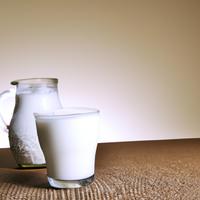
1 serving (244 grams) contains 83 calories, 8.3 grams of protein, 0.2 grams of fat, and 12.0 grams of carbohydrates.

Log this food in SnapCalorie

Nutrition Information
Calories |
83 | ||
|---|---|---|---|
% Daily Value* |
|||
| Total Fat | 0.2 g | 0% | |
| Saturated Fat | 0.1 g | 0% | |
| Polyunsaturated Fat | 0 g | ||
| Cholesterol | 5 mg | 1% | |
| Sodium | 102.0 mg | 4% | |
| Total Carbohydrates | 12.0 g | 4% | |
| Dietary Fiber | 0 g | 0% | |
| Sugars | 12.0 g | ||
| protein | 8.3 g | 16% | |
| Vitamin D | 100 mcg | 500% | |
| Calcium | 299 mg | 23% | |
| Iron | 0.1 mg | 0% | |
| Potassium | 382.0 mg | 8% | |
* Percent Daily Values are based on a 2,000 calorie diet. Your daily values may be higher or lower depending on your calorie needs.
Food Attributes
Source of Calories
About Fatfree milk
Fat-free milk, also known as skim milk, is a dairy product made by removing most of the fat from whole milk, leaving less than 0.5% milkfat. This process retains essential nutrients like calcium, vitamin D, and protein while significantly reducing calorie and fat content. Popular across various cuisines and cultures, fat-free milk is used in beverages, baked goods, cereals, and smoothies. Its low-fat composition makes it a heart-healthy choice for those managing cholesterol levels or seeking weight control. However, some people find its thinner texture and less creamy taste less appealing compared to higher-fat options. Fat-free milk is versatile and pairs well with diets emphasizing lower fat intake, but it may not be suitable for individuals with lactose intolerance or dairy allergies. Overall, it offers a nutrient-rich option for those looking to balance taste and health.



